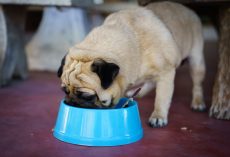We don't mean any harm by giving our dogs food here and there, but where do we draw the line? That innocent piece of food could be toxic and it's not worth the risk to your dog's health. Instead, it's easy to become informed about foods we should and should not give to our furry ones. You'll probably find conflicting reports on the internet about some fruits, so here's the real deal:
Can dogs eat grapes?
The simple answer is “no.” Dogs experience violent adverse effects when they eat either grapes or their shriveled cousins, raisins. Purple or green, seeded or seedless, it doesn’t seem to matter. Within mere hours of ingesting grapes or raisins, dogs have been observed to begin having fits of vomiting and excessive urination. Within just a few days, dogs have experienced kidney failure, lapsed into comas, and died from eating grapes.
If you see your dog eat some grapes, the best course of action is to proceed directly to a veterinarian, who will induce vomiting.
Bananas?
Yes, absolutely. Feel free to allow your dog to eat it in moderation.
Apples?
Yes; dogs may not particularly care for the outer skin of an apple, but as long as the seeds are removed, apples are safe for dogs to eat.
Pears?
Same as above with apples, with all the associated warnings about seeds and cores.
Oranges?
Another yes. Oranges, peeled and de-seeded are fine for dogs. Aside from the reactions that many of us have in eating lemons and limes, which dogs share, even the sourest citrus fruit seems to work okay for dogs, if they’re so inclined.
Peaches?
No! The pit of a peach contains cyanide, which is deadly to pretty much everyone. Cynaide may seep out from the pit into the tender peach meat that is closest to the center. The same can be said of plums and other fruits with a solid, centralized core or seed at the center. Aside from the natural poison in the core, that seed is large enough to obstruct or block the intestines of your dog. Probably better to avoid store-bought canned fruits and fruit-cups, too, which often contain way more sugar than a dog is normally accustomed to processing.
Watermelon?
Yes, dogs can eat watermelon with no problems. It is advised that you remove the seeds before.
Strawberries?
Yes. You should probably remove the leaves and any stem that remains on top of the strawberry.
Blueberries?
Yes again! I wouldn’t recommend giving your dog a whole bowl of them.
Raspberries?
Another yes, with the same conditions. Dogs aren’t accustomed to the sugar content even of normal, non-canned fruits.
Pineapple?
Yes, pineapples are fine for dogs, provided, of course, you’ve removed the prickly outer husk of this island favorite.
Mango?
Peel the thick mango skin and remove the pit.
Coconut?
Both the coconut meat and milk are all right for dogs, as long as they don’t have too much of either.
As you can see, most fruits are okay for dogs, but always do some research to confirm it. Last year, my 7-pound Yorkie swiftly gobbled up a grape that had accidentally rolled off my kitchen counter and onto the floor. By the time I grabbed him, the grape was long gone. I instantly panicked and after doing some quick reading about other dog owners' experiences with grapes, I immediately called the vet and took him in. Luckily, they were able to get the grape out of his system before it was digested, but they had to run blood tests for his kidneys and administer charcoal to detox his body. Besides the fact that I still can't look at a grape without cringing, we got through the situation and learned a hefty lesson! So, when it comes to food and your dogs, it's always better to be safe than sorry!
Article Source: Dogster









